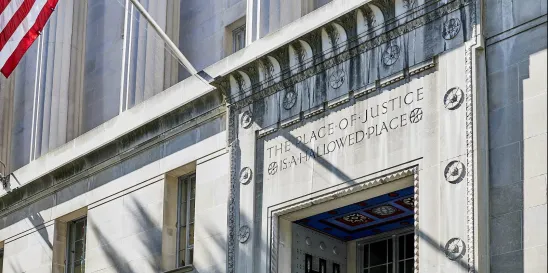At the Global Investigations Review Annual Meeting in New York on September 21, 2023, Principal Associate Deputy Attorney General Marshall Miller (“Miller”) delivered remarks that provide an invaluable glimpse into the Department of Justice’s (“DOJ’s) current and forthcoming priorities and initiatives on corporate criminal enforcement. Miller’s remarks shed light on various key areas of DOJ’s enforcement focus, including DOJ’s continued encouragement of voluntary self-disclosure and increasing attention towards safeguarding national security interests. Miller also emphasized DOJ’s commitment to consistency, predictability and transparency in its corporate enforcement work with an aim that such commitment will help companies better predict outcomes for certain criminal violations and implement robust compliance programs to prevent criminal prosecution.
Emphasis on Voluntary Self-Disclosure
DOJ continues to prioritize incentivizing companies to self-disclose criminal misconduct. Indeed as Miller put it, DOJ “is placing a new and enhanced premium on voluntary self-disclosure.” In line with this effort and to promote consistent application, earlier this year on February 22nd, DOJ announced its new single voluntary self-disclosure (“VSD”) policy adopted by and effective across all 94 U.S. Attorneys’ Offices.[1]
Through its new VSD policy, DOJ also now defines precise requirements for a company to obtain a presumption of a declination by self-reporting. This is even available for companies with, what Miller called, “aggravating circumstances.” Miller highlighted Corsa Coal Corporation (“Corsa”) as an example of DOJ making good on its VSD policy. Corsa received a declination despite engaging in bribery to secure $143 million in coal contracts an Egyptian state-owned company. Corsa’s timely and voluntary self-disclosure, cooperation, remediation, and disgorgement of profits played a crucial role in its favorable outcome. Miller noted, “because [Corsa] stepped up and owned it, it received a declination,” highlighting a lesson for all companies seeking a declination from the DOJ. Companies hoping for a declination with the DOJ should heed that self-reporting is not the end all be all, but rather only the first step in the process; meaningful cooperation (including providing helpful information about the individual wrongdoers involved) and investing in an effective compliance program to detect and fix misconduct must also be demonstrated.
DOJ intends for the VSD policy to provide clearer requirements for self-reporting and benefits for companies who take advantage of the policy and timely self-report. DOJ reports seeing early significant returns on this new policy with many companies self-disclosing, resulting in investigations.[2] However, as DOJ admits, a full assessment of the effectiveness of the VSD Policy is still premature. Only time will tell how successful and lenient the policy will be for corporations looking to earn credit by self-disclosing. The calculus of voluntary disclosure may have shifted, but it is still too early to tell whether the shift is material for companies facing that difficult decision.
Self-Disclosure in Mergers & Acquisitions (M&A)
A DOJ self-disclosure policy within the M&A context is in the works. Miller noted that the DOJ understands the importance of not discouraging companies with strong compliance programs from acquiring companies with histories of misconduct, especially when the acquiring companies engaged in careful pre-acquisition and post-acquisition due diligence and remediation of such misconduct. Currently, the Criminal Division’s Corporate Enforcement Policy offers the possibility of a declination for misconduct discovered during the pre- or post-acquisition due diligence. This development is particularly potentially significant for private equity firms – serial acquirers of companies. Such firms may do well to enhance their due diligence programs, depending, of course, on the policy’s final terms.
Miller referenced a December 2022 declination for Safran SA, an acquiring company that voluntarily self-disclosed bribery misconduct of its acquired companies, cooperated and remediated the misconduct. That company secured a declination with disgorgement. DOJ anticipates extending this approach across the board for M&A transactions, with an emphasis on the “critical importance of the compliance function having a prominent seat at the table in evaluating and de-risking M&A decisions.” Forthcoming guidance from Deputy Attorney General Monaco regarding voluntary self-disclosure in the M&A space will be provided in the near future. Such guidance will likely underscore the importance of early detection and reporting of misconduct prior to formal acquisition or closing, and an evaluation of the strength of acquiring companies’ compliance programs.
Dire Consequences for Companies Breaching Prior Resolution Agreements
Companies with prior resolution agreements should carefully comply with their obligations under such agreements. Miller stressed that DOJ will not hesitate to hold a company accountable with severe penalties for breaching the terms an agreement resolving criminal charges (e.g., deferred prosecution agreements, non-prosecution agreements, corporate probation terms, etc.). In fact, Miller stated that requiring a guilty plea after such breaches is now DOJ’s standard policy. DOJ’s stringent approach with severe penalties will also be applied to all resolution agreements, including breaches of civil settlement agreements and violations CFIUS mitigation agreements or orders.
Incentivizing Good Corporate Citizenship Through Compensation
To enhance compliance, the DOJ expects (especially when evaluating the strength of a compliance program) companies to implement a compensation system that effectively promotes good behavior and deters wrongdoings. To this end, Deputy Attorney General Monaco directed the DOJ’s Criminal Division earlier this year on March 15th to launch a two-part pilot program on compensation incentives and clawbacks.
Under this pilot program, all corporate resolutions with the Criminal Division will require that companies include “compliance-promoting criteria within its compensation and bonus system.” Such criteria can include prohibitions on bonuses for personnel who fail to satisfy compliance performance requirements, incentives linked to commitment to compliance processes and promotion thereof, and disciplinary measures that claw back bonuses or compensation to employees who engage in legal misconduct or fail in their managerial oversight to report or prevent such misconduct.
With respect to clawbacks specifically, the pilot program also provides an incentive for companies to claw back or withhold compensation from wrongdoers. Companies can now reduce potential criminal penalties if they make a good faith attempt to claw back compensation even if they are ultimately unsuccessful. Citing this as a double benefit for companies, Miller noted the program will allow companies to reduce the same dollar amount from the applicable fine for the misconduct by the amount they claw back from the wrongdoers. Companies “get to keep the money it recoups from the wrongdoer, and [they] get to subtract that amount off [their] fine.”
Companies that cannot claw back monies at the time of resolution will have to pay the applicable fine, but will have a reserved credit equaling the amount they attempted to claw back from the wrongdoer. If successful in their clawback efforts, the reserved credit will be released to the company. But, even if unsuccessful, DOJ will credit the good faith attempt by releasing to the company up to 25% of the sought amount.
Importantly, Miller specified that companies should have an active clawback policy that is “regularly deployed.” The DOJ will not take kindly to superficial or paper clawback policies that have no real bite to its bark and will view such policies as “no better than having no policy at all.” Companies should also regularly review their clawback policies and employment agreements to ensure they promote compliance long before such companies discover any wrongdoings.
Dedication to Combatting National Security Compliance Failures
Miller focused the latter half of his remarks on how corporate enforcement actions tied to national security risks are now taking center stage for DOJ, which has detected an increasing number of cases implicating national security across industries with many cases involving sophisticated money laundering, cryptocrime, technology theft, and sanctions and export evasion, and terrorism crimes. To combat this growing threat, DOJ has dedicated significant resources, including hiring new prosecutors (25 to the National Security Division and 6 to the Bank Integrity Unit), expanding units focused on national security-related economic crimes (e.g., violations of the Money Laundering Control Act, the Bank Secrecy Act, and economic and trade sanctions programs) and forming the Disruptive Technology Strike Force to “target illicit actors, harden technology supply chains, and protect critical technological assets from acquisition by [United States’] adversaries.”
DOJ’s charged focus on national security is a signal for companies to ensure that their compliance protocols have updated and robust measures to mitigate national security risks. Certainly, any company that operates in high-risk regions controlled by autocracies must make national security compliance its highest priority. DOJ warns that all companies should carefully look over all their transactions operating in dangerous parts of the world and conduct diligence to safeguard against national security violations (e.g., money-laundering monies to support terrorism, using subsidiaries to conduct illicit business in North Korea in support of its nuclear weapons program, skirting export controls to funnel military technologies to United States adversaries, etc.).
Takeaways
By sharing its latest corporate criminal enforcement priorities, Miller stressed DOJ’s commitment to fostering a consistent, transparent and predictable enforcement environment that encourages companies not only to detect, deter, and report corporate misconduct but also to collaborate with DOJ in addressing evolving corporate crimes impacting national security. Companies should heed Miller’s remarks, and revisit their compliance programs with legal counsel to enhance measures geared towards promoting corporate responsibility and good citizenship. This includes refining company internal disclosure and reporting protocols, structuring compensation and bonus systems to optimize compliance, and implementing effective mechanisms to detect and prevent national security risk.
FOOTNOTES
[1] The VCD Policy is further discussed in detail in https://www.corporatesecuritieslawblog.com/2023/02/corporate-voluntary-self-disclosure-of-criminal-activity-more-of-the-same-or-a-real-sea-change/
[2] Additional analysis of the DOJ’s latest corporation resolutions can be found in https://www.law360.com/articles/1719945/self-disclosure-lessons-from-exemplary-corp-resolutions




 />i
/>i

